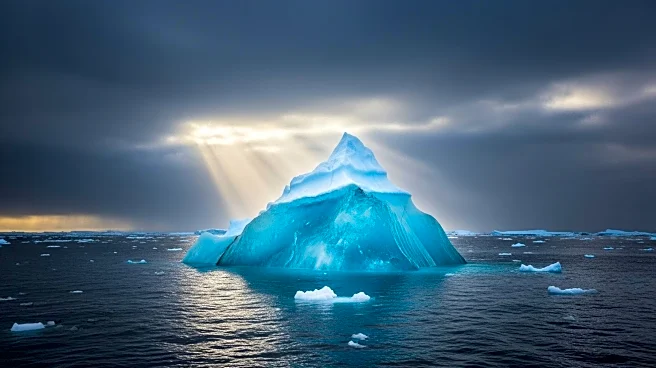What is the story about?
What's Happening?
Recent weeks have seen a dramatic rise in atmospheric temperatures over Antarctica, reaching unprecedented levels. This increase is linked to a significant decrease in the speed of stratospheric currents and a reduction in the rate of ozone layer thinning. The Antarctic region, typically known for its harsh, cold conditions, is experiencing an anomaly that highlights the broader impacts of climate change. According to Martin Jucker from the University of New South Wales, temperatures that are usually around -67°F have soared to -4°F. This change is attributed to the collapse of the polar vortex's speed, with cold air masses now moving at less than 62 miles per hour. Such phenomena are expected to occur only once every two decades, but four such anomalies have been recorded since the beginning of the 21st century.
Why It's Important?
The changes in Antarctica are significant as they affect global sea levels and marine ecosystems. The melting ice adds fresh water to the ocean, impacting salinity and destabilizing climate patterns. These shifts can disrupt nutrient flows, affecting fish populations and the broader food chain. The loss of sea ice endangers local wildlife and contributes to global sea level rise. The Antarctic climate changes are part of a larger trend of global warming, with potential consequences for weather patterns worldwide. Increased frequency and intensity of natural disasters, such as storms and floods, could result from these changes.
What's Next?
Scientists are closely monitoring these developments to understand their long-term implications. The data collected from Antarctica is crucial for climate models predicting future trends. By analyzing current anomalies, researchers aim to refine their understanding of climate dynamics and improve forecasting accuracy. This knowledge is essential for policymakers and communities worldwide as they work to mitigate the effects of climate change and adapt to a rapidly changing environment. Collaborative efforts are needed to reduce greenhouse gas emissions and promote sustainable practices.
Beyond the Headlines
The international community must address the challenges posed by Antarctic climate changes. Initiatives aimed at preserving marine life and protecting vulnerable ecosystems must be prioritized. The global response will require coordination across multiple sectors, including government, industry, and civil society, to create impactful solutions. The future of Antarctica's climate remains uncertain, but the urgency for action is clear. As the planet continues to warm, the consequences of inaction could be dire.















